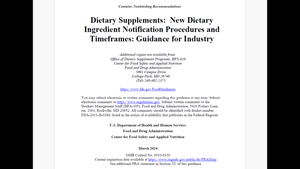Takeaways: Targeted energy solutions
Energy supplements and drinks target ingredients for boosting ATP and inhibiting fatigue to deliver a range of benefits related to fueling exercise.

Exercise requires proper energy, which the body supplies via several different processes. Each process addresses varying aspects of exercise, including oxygen availability (aerobic vs. anaerobic), intensity and duration. How well an athlete or active consumer matches the right nutritional fuel to their sport or exercise type can greatly affect performance.
The Mighty Mitochondria
Energy is transferred from the broken bonds of adenosine triphosphate (ATP), the “energy molecule.” The muscles have some stored ATP, which powers the first few seconds of anaerobic exercise.
Creatine phosphate is also stored in the muscles and helps quickly restore spent ATP in anaerobic conditions, which is why creatine is a popular supplement, especially for sprinters and exercise bursts.
Magnesium and zinc are cofactors in enzymes that drive several methods of ATP/energy production. Iron helps deliver oxygen and is important during aerobic energy production.
Under aerobic conditions, the body can use glucose and fats to feed cellular respiration, a series of ATP-producing processes. This is key for moderate- to high-intensity exercise, as it provides energy for longer durations.
Carnitine helps shuttle long chain fats into the mitochondria to make energy via oxidation reactions, and coenzyme Q10 transports electrons to make additional ATP via a gradient.
Carbs are the primary fuel to make glucose for energy. In the absence of glucose, such as in a very low carb diet, ketones are made in the liver and can be a source of energy for the brain and other tissues.
A ketogenic state can also increase fat oxidation for energy; medium chain triglycerides (MCTs) have been a popular supplement for more quickly providing energy and increasing ketone production.
Timing is everything
One of the most popular “energy” ingredients is caffeine, which blocks fatigue signaling in the brain and stimulates the central nervous system. Caffeine stays in the body from four to six hours, so timing caffeine consumption is important to proper sleep-wake cycles.
The sports nutrition market is increasingly wary of nutrient timing, as there may be optimal times for consumption of certain ingredients to maximize benefits.
Creatine preloading is thought to increase muscle stores to stretch anaerobic exercise a bit farther. However, the current research is inconclusive as to whether taking creatine before or after a workout is better.
Innovative product delivery offers more options
Supplements and mixable powders are ubiquitous in sports, as are functional beverages. but this category is also seeing multiple benefits including muscle gain, focus and recovery, according to beverage consultant Imbibe Inc.
Mitochondrial energy ingredients are trending, including CoQ10 and carnitine. MCTs are in that group but also highlight the growing keto trend in energy and sports drinks.
Beyond drinks, energy products are following the greater sports nutrition migration into a wide range of delivery forms, from MCT oil creamer and caffeinated peanut butter to gummies and edible tabs.
To download the full Personalized Energy and Sports Performance digital magazine, click here.
About the Author(s)
You May Also Like






.png?width=800&auto=webp&quality=80&disable=upscale)